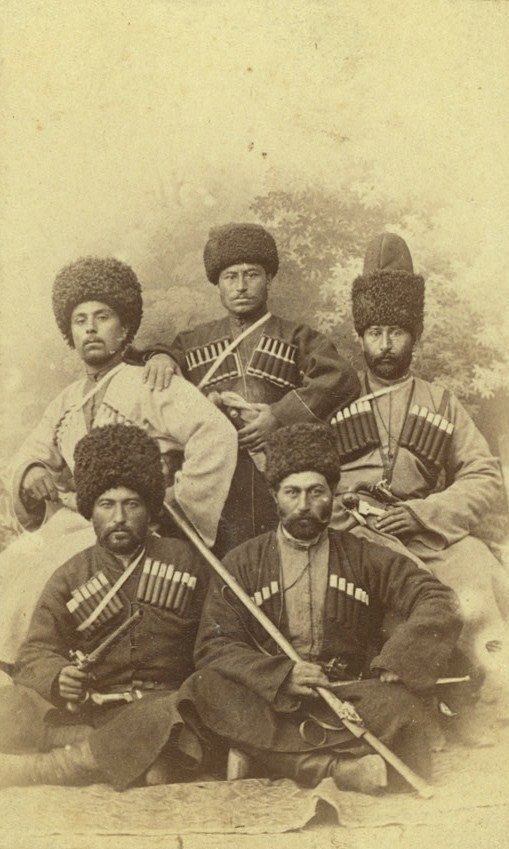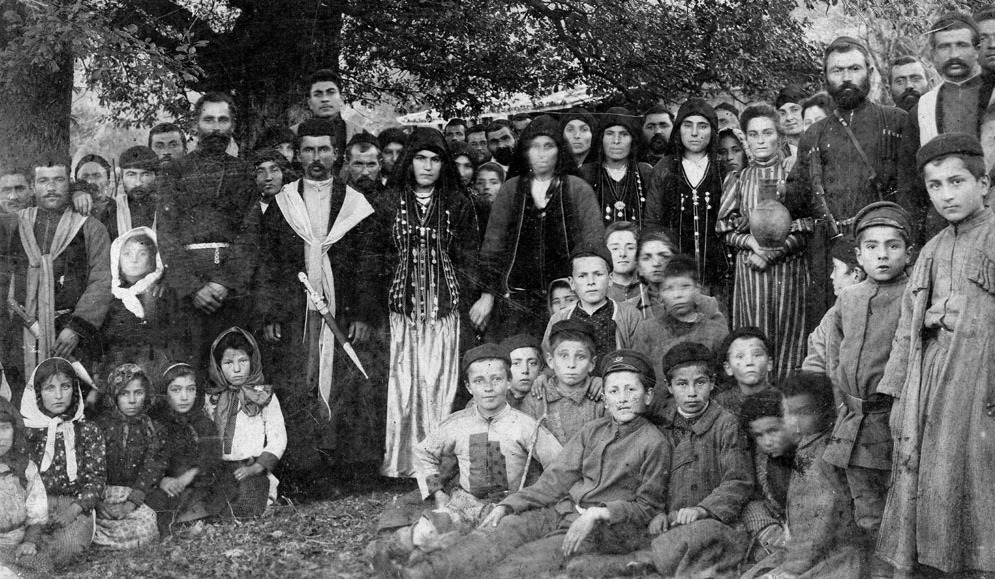|
Kists
The Kists ( ka, ქისტები ''kist'ebi'', ce, Kistoj, Kisti, Nokhcho, Nakhcho) are a Chechen subethnos in Georgia. They primarily live in the Pankisi Gorge, in the eastern Georgian region of Kakheti, where there are approximately 9,000 Kist people. The modern Kists are not to be confused with the historical term ''Kists'', an ethnonym of Georgian origin, which was used to refer to the Ingush people in the Middle Ages. Origins The Kist people's origins can be traced back to their ancestral land in lower Chechnya. In the 1830s and 1870s they migrated to the eastern Georgian Pankisi Gorge and some adjoining lands of the provinces of Tusheti and Kakheti. Named "Kists" (ქისტები) in Georgian, they are closely related culturally, linguistically and ethnically to other Nakh-speaking peoples such as Ingushes and Chechens, but their customs and traditions also share many similarities with the eastern Georgian mountaineers. Around the same region of Georgia, the ... [...More Info...] [...Related Items...] OR: [Wikipedia] [Google] [Baidu] |
Nakh Peoples
The Nakh peoples, also known as ''Vainakh peoples'' (Chechen/Ingush: , apparently derived from Chechen , Ingush "our people"; also Chechen-Ingush), are a group of Caucasian peoples identified by their use of the Nakh languages and other cultural similarities. These are chiefly the ethnic Chechen (including the Chechen sub-ethnos, the Kists, in Georgia), Ingush and Bats peoples of the North Caucasus, including closely related minor or historical groups. The ethnonym "Nakhchi" Nakh peoples and Vainakh peoples are two terms that were coined by Soviet ethnographers such as the Ingush ethnographer Zaurbek Malsagov. The reasoning behind the creation of these terms was to unite the closely related nations of Chechen and Ingush into one term. The terms "Vainakh" (our people) and "Nakh" (people) were first used as a term to unite two peoples in 1928. It was subsequently popularized by other Soviet authors, poets, and historians such as Mamakaev and Volkova in their research. Accor ... [...More Info...] [...Related Items...] OR: [Wikipedia] [Google] [Baidu] |
Ingush People
The Ingush (, inh, ГIалгIай, translit=Ghalghaj, pronounced ) per Oxford dictionary "a member of a people living mainly in Ingushetia in the central Caucasus." Ingushetia is a federal republic of Russian Federation. The Ingush are predominantly Sunni Muslims and speak the Ingush language. According to 19th-century scientist Semen Bronevski the Ingush are known as Kisti, Ghalgha, Ingushi and they use the names interchangeably. According to the German scientist Peter Pallas who visited the Caucasus the Ingush are known as Loamaro, Kisti, Ghalghai, Ingush. Etymology The name ''Ingush'' is derived from the ancient village ''Angusht'', which was renamed into ''Tarskoye'' and transferred to North Ossetia in 1944 after the deportation of 23 February 1944, a.k.a. operation "Lentil". The Ingush, a nationality group indigenous to the Caucasus, mostly inhabit Ingushetia. They refer to themselves as Ghalghai (from Ingush: ''Ghala'' ("fortress" or "town") and ''ghai'' ("inhabita ... [...More Info...] [...Related Items...] OR: [Wikipedia] [Google] [Baidu] |
Bats People
The Bats people ( ka, ბაცი, tr) or the Batsbi (ბაცბი), are Nakh-speaking Tushetians in the country of Georgia. They are also known as the Ts’ova-Tush (წოვათუშები) after the Ts’ova Gorge in the historic Georgian mountain region of Tusheti. The group should not be confused with the neighbouring Kists – also a Nakh-speaking people who live in the nearby Pankisi Gorge. Language and customs Part of the community still retains its own Bats language ("batsbur mott"), which has adopted many Georgian loan-words and grammatical rules and is mutually unintelligible with the two other Nakh languages, Chechen and Ingush. As Professor Johanna Nichols put it, " he Batsburlanguage is related to Chechen and Ingush roughly as Czech is related to Russian nd the Batsbinot belong to vai naakh nor their language to vai mott, though any speaker of Chechen or Ingush can immediately tell that the language is closely related and can understand some phrases of ... [...More Info...] [...Related Items...] OR: [Wikipedia] [Google] [Baidu] |
Khevsureti
Khevsureti (Georgian: ხევსურეთი, ''a land of valleys'') is a historical-ethnographic region in eastern Georgia. They are the branch of Kartvelian (Georgian) people located along both the northern (Pirikita khevsureti, Georgian: პირიქითა ხევსურეთი) and southern (Piraketa khevsureti, Georgian: პირაქეთა ხევსურეთი) slopes of the Great Caucasus Mountains. Geography Comprising the small river valleys of the Migmakhevi, Shatili, Arkhoti and the Aragvi, the province borders with Ingushetia and Chechnya and is included in the present-day Dusheti Municipality, Mtskheta-Mtianeti region. Khevsureti, with the area of approximately 405.3 square miles (1050 km²), is traversed by the main crest of the Greater Caucasus Range, dividing the province in two unequal parts. Pirikita Khevsureti ("thither") is a larger one, with the area of c. 565 km², while Piraketa Khevsureti ("hither") occupies 428&nbs ... [...More Info...] [...Related Items...] OR: [Wikipedia] [Google] [Baidu] |
Pankisi Gorge
Pankisi ( ka, პანკისი) or the Pankisi Gorge (, ''Pankisis Kheoba'') is a valley region in Georgia, in the upper reaches of River Alazani just south of Georgia’s historic region of Tusheti between Mt Borbalo and the ruined 17th-century fortress of Bakhtrioni. Administratively, it is included in the Akhmeta municipality of the Kakheti region. An ethnic group called Kists of Chechen roots form the majority (75%) in the area. Area conditions It had allegedly often been used as a base for transit, training and shipments of arms and financing by Chechen rebels and Islamic militants, including foreign fighters, many of whom followed Ruslan Gelayev. Most of these accusations were around 2002, but others allege that it is more peaceful now, although there are still many Chechen refugees living there. The former senior Islamic State leader Tarkan Batirashvili, otherwise known as "Omar the Chechen", grew up in the area where some of his family still lives. In 2014, Bat ... [...More Info...] [...Related Items...] OR: [Wikipedia] [Google] [Baidu] |
Tusheti
Tusheti ( ka, თუშეთი) is a historic region in northeast Georgia. Geography Located on the northern slopes of the Greater Caucasus Mountains, Tusheti is bordered by the Russian republics of Chechnya and Dagestan to the north and east, respectively; and by the Georgian historic provinces Kakheti and Pshav-Khevsureti to the south and west, respectively. The population of the area is mainly ethnic Georgian people, Georgians called Tushs or Tushetians ( ka, tushebi). Historically, Tusheti comprised four mountain communities: the Tsova (living in the Tsova Gorge), the Gometsari (living along the banks of the Tushetis Alazani River), the Pirikiti (living along the banks of the Pirikitis Alazani River) and the Chaghma, living close to the confluence of the two rivers). Administratively speaking, Tusheti is now part of the ''raioni'' of Akhmeta, itself part of Georgia's eastern region of Kakheti. The largest village in Tusheti is Omalo. History The area is thought to have l ... [...More Info...] [...Related Items...] OR: [Wikipedia] [Google] [Baidu] |
Georgia (country)
Georgia (, ; ) is a transcontinental country at the intersection of Eastern Europe and Western Asia. It is part of the Caucasus region, bounded by the Black Sea to the west, by Russia to the north and northeast, by Turkey to the southwest, by Armenia to the south, and by Azerbaijan to the southeast. The country covers an area of , and has a population of 3.7 million people. Tbilisi is its capital as well as its largest city, home to roughly a third of the Georgian population. During the classical era, several independent kingdoms became established in what is now Georgia, such as Colchis and Iberia. In the early 4th century, ethnic Georgians officially adopted Christianity, which contributed to the spiritual and political unification of the early Georgian states. In the Middle Ages, the unified Kingdom of Georgia emerged and reached its Golden Age during the reign of King David IV and Queen Tamar in the 12th and early 13th centuries. Thereafter, the kingdom decl ... [...More Info...] [...Related Items...] OR: [Wikipedia] [Google] [Baidu] |
Khevsur
Khevsurians ( ka, ხევსურები) are an ethnic sub-group of Georgians, mainly living in Khevsureti, on both sides of the Caucasus Mountain Chain in the watersheds of the rivers Aragvi and Argun. There are some villages in Khevi, Ertso-Tianeti, Kakheti ( Shiraki), Kvemo Kartli (Gardabani) also where Khevsurians reside. Khevsurians speak the Georgian language in Khevsurian dialect. For a long time, Khevsurians have maintained their traditional culture: clothing, weapons, and polyphonic music.Большая советская энциклопедия. Гл. ред. Б. А. Введенский, 2-е изд. Т. 46. Фусе — Цуруга. 1957. 672 стр., илл. и карты; 48 л. илл. и карт. Khevsurians first are mentioned in the 10th-century manuscripts. In 1745 they were described by Vakhushti Bagrationi in his work ''Description of the Kingdom of Georgia''. In the old Georgian chronicle, Khevsureti and Pshavi are referred to together as "Pkh ... [...More Info...] [...Related Items...] OR: [Wikipedia] [Google] [Baidu] |
Christians
Christians () are people who follow or adhere to Christianity, a monotheistic Abrahamic religion based on the life and teachings of Jesus Christ. The words ''Christ'' and ''Christian'' derive from the Koine Greek title ''Christós'' (Χριστός), a translation of the Biblical Hebrew term ''mashiach'' (מָשִׁיחַ) (usually rendered as ''messiah'' in English). While there are diverse interpretations of Christianity which sometimes conflict, they are united in believing that Jesus has a unique significance. The term ''Christian'' used as an adjective is descriptive of anything associated with Christianity or Christian churches, or in a proverbial sense "all that is noble, and good, and Christ-like." It does not have a meaning of 'of Christ' or 'related or pertaining to Christ'. According to a 2011 Pew Research Center survey, there were 2.2 billion Christians around the world in 2010, up from about 600 million in 1910. Today, about 37% of all Christians live in the Am ... [...More Info...] [...Related Items...] OR: [Wikipedia] [Google] [Baidu] |
Shatili
Shatili ( ka, შატილი, ''Šat’ili'' ) is a historic highland village in Georgia, near the border with Chechnya. It is located on the northern slope of the Greater Caucasus mountains, in the historical Georgian province of Upper Khevsureti, which is now part of the modern-day region (''mkhare'') of Mtskheta-Mtianeti. As of 2014 census, population of the village was 22. Geography Located in the deep Arghuni gorge at approximate 1,400 meters, the village is actually a unique complex of medieval-to-early modern fortresses and fortified dwellings of stone and mortar which functioned both as a residential area and a fortress guarding the northeastern outskirts of the country. The fortress consists of the terraced structures dominated by flat-roofed dwellings and some 60 towers which cluster together to create a single chain of fortifications. Unique architectural methods and thought are realised in Shatili: selection of location, development of the land with complicated ... [...More Info...] [...Related Items...] OR: [Wikipedia] [Google] [Baidu] |
Second Chechen War
The Second Chechen War (russian: Втора́я чече́нская война́, ) took place in Chechnya and the border regions of the North Caucasus between the Russia, Russian Federation and the Chechen Republic of Ichkeria, from August 1999 to April 2009. In August 1999, Islamist fighters from Chechnya War of Dagestan, infiltrated Russia's Dagestan region, violating Russia's borders. During the initial campaign, Russians, Russian military and pro-Russian Chechens, Chechen paramilitary forces faced Chechen separatists in open combat and seized the Chechen capital Grozny after a winter Battle of Grozny (1999–2000), siege that lasted from December 1999 until February 2000. Russia established direct rule over Chechnya in May 2000 although Chechen militant Resistance movement, resistance throughout the North Caucasus region continued to inflict heavy Russian casualties and challenge Russian political control over Chechnya for several years. Both sides carried out attacks a ... [...More Info...] [...Related Items...] OR: [Wikipedia] [Google] [Baidu] |



.jpg)

.jpg)

